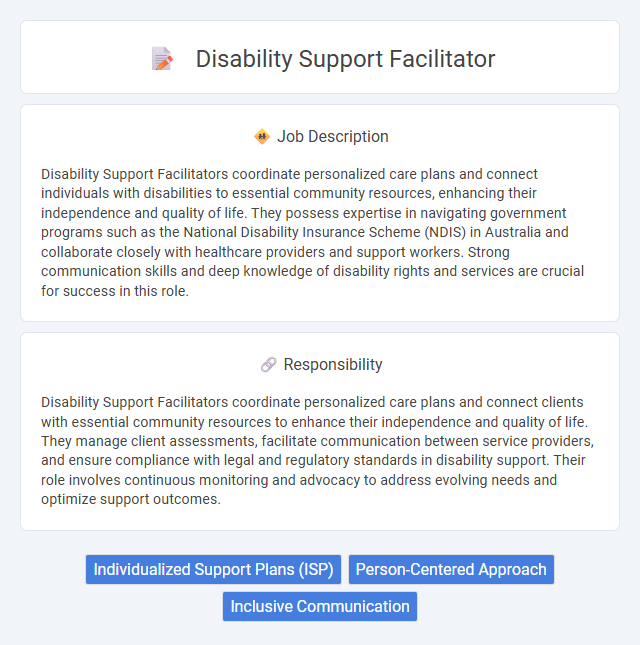
Disability Support Facilitators coordinate personalized care plans and connect individuals with disabilities to essential community resources, enhancing their independence and quality of life. They possess expertise in navigating government programs such as the National Disability Insurance Scheme (NDIS) in Australia and collaborate closely with healthcare providers and support workers. Strong communication skills and deep knowledge of disability rights and services are crucial for success in this role.
Disability Support Facilitators likely thrive when working with individuals experiencing physical, intellectual, or psychosocial disabilities, as the role demands empathy, patience, and strong communication skills. People who possess a natural inclination for advocacy and problem-solving may be better suited to navigate the complexities of coordinating personalized care and support plans. Those who find it challenging to manage emotional stress or require a highly structured environment might find this position less fitting.
Qualification
Disability Support Facilitators typically require a qualification in social work, psychology, community services, or a related field, such as a Diploma or Bachelor's degree. Relevant certifications in disability support, mental health, and case management enhance job readiness and effectiveness. Practical experience working with individuals with disabilities and strong communication skills are also essential qualifications for the role.
Responsibility
Disability Support Facilitators coordinate personalized care plans and connect clients with essential community resources to enhance their independence and quality of life. They manage client assessments, facilitate communication between service providers, and ensure compliance with legal and regulatory standards in disability support. Their role involves continuous monitoring and advocacy to address evolving needs and optimize support outcomes.
Benefit
Disability Support Facilitators likely improve the quality of life for individuals with disabilities by coordinating essential services and personal care plans. Their role probably enhances access to resources, increasing independence and social inclusion for clients. Employers may benefit from fostering a more supportive and compliant environment, potentially reducing workplace barriers and improving overall productivity.
Challenge
The role of a Disability Support Facilitator likely involves navigating complex and varied client needs, which can present significant challenges in creating personalized support plans. There is a probability that effective communication and coordination between clients, families, and service providers require careful skill to ensure seamless service delivery. Managing fluctuating resources and funding constraints may also pose ongoing challenges that require adaptability and problem-solving abilities.
Career Advancement
Disability Support Facilitators play a crucial role in coordinating personalized care plans, ensuring clients receive the support needed for greater independence. Advancing in this career often involves gaining specialized certifications, such as in mental health or community services, and developing strong case management skills. Opportunities for career growth include moving into senior support coordinator roles, management positions, or specializing in policy development within disability services.
Key Terms
Individualized Support Plans (ISP)
Disability Support Facilitators develop and implement Individualized Support Plans (ISP) tailored to each client's unique needs, goals, and abilities. They coordinate with multidisciplinary teams to ensure that services and supports align with the ISP, promoting client empowerment and independence. Accurate documentation and regular review of ISPs are essential for measuring progress and adapting interventions effectively.
Person-Centered Approach
Disability Support Facilitators specialize in implementing a person-centered approach that tailors support plans to individual needs and goals, ensuring empowerment and independence. They coordinate resources and services, promoting collaboration between clients, families, and service providers to enhance quality of life. This role requires expertise in communication, advocacy, and flexible problem-solving to adapt to diverse disability support requirements.
Inclusive Communication
Disability Support Facilitators specialize in creating and implementing inclusive communication strategies that empower individuals with disabilities to express their needs and preferences effectively. They utilize tools like assistive technologies, plain language, and visual aids to bridge communication gaps and promote understanding in diverse environments. Their role is crucial in fostering accessibility and ensuring that clients are actively involved in decision-making processes related to their care and support.
 kuljobs.com
kuljobs.com